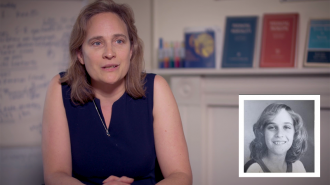
- Our studies
- Our research
- Publications and resources
- Data access and training
- About
- News
- Events
- Get in touch
- Join our mailing list

Welcome to our news and blogs section. Here you’ll find the latest developments and insights from across our longitudinal studies.
UCL and the University of Bristol are to lead the Population Research UK (PRUK) co-ordination hub, part of an existing strategic investment from the UKRI Infrastructure Fund.

New data from the Age 46 Sweep of the 1970 British Cohort Study (BCS70) are now available for researchers to download from the UK Data Service.

Children whose mothers smoked during pregnancy are not born predisposed to smoking through absorbing nicotine in the womb, a study has found.

Among the Baby Boomers and Generation X, people who had higher levels of emotional wellbeing during childhood and adolescence were more likely to report being satisfied with life when they reached adulthood.

Millennium Cohort Study findings have provided evidence for The Children’s Society’s eighth annual Good Childhood Report, which examines the state of children’s wellbeing across the UK.

Children with autism are at greater risk of being bullied by both their siblings and their peers, compared to those without autism.

Are boys more sensitive to the state of the local job market when choosing their GCSE subjects? And why are migrant and ethnic minority mothers at increased risk of mental ill health? Researchers have been using CLS study data to tackle these and other key questions.

With the 7-Up children returning to our TV screens this week at age 63 (4 June), Professor Alissa Goodman reflects on the importance of the show and the longitudinal studies she manages at CLS.

Children who play and listen to music, draw and paint, and read for pleasure tend to have higher levels of self-esteem, new research shows.
At this event, organised by CLOSER, we will present results on the measurement properties of mental health measures, before and after harmonising these so that they can be compared across time and study.

Is screen time really behind the rise in teenage mental health problems? How is the ‘sandwich generation’ faring as they care for their ageing parents and their children and grandchildren? Researchers have been using CLS study data to tackle these and other key questions.

Children who get on with their peers are more able to cope with stressful events in mid-life, new findings show.

Rates of psychological distress increased between mid-adolescence and early adulthood for members of Generation X, according to a new study.
Ryan Bradshaw
Senior Communications Officer
Phone: 020 7612 6516
Email: r.bradshaw@ucl.ac.uk